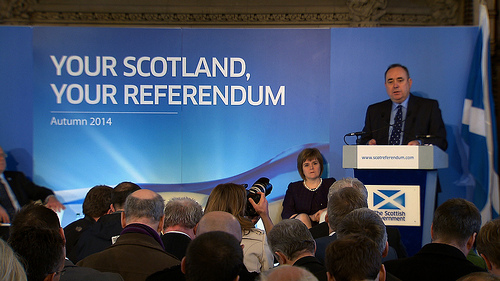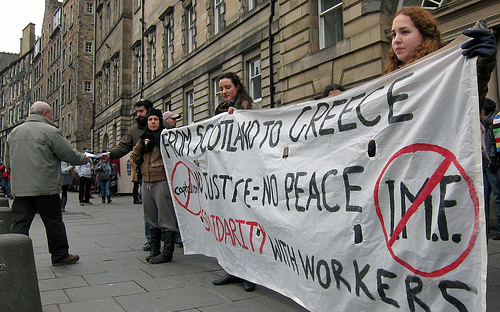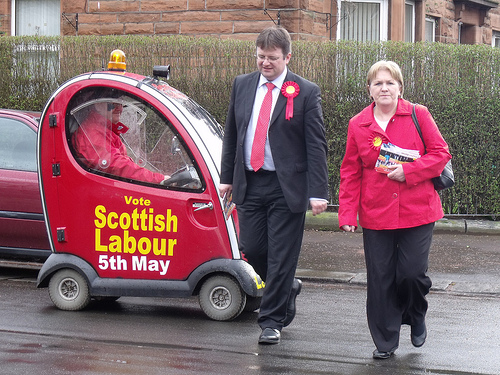
Supporters of Sarkozy may be hoping that the recent horrific killings in the South West of France will indirectly help his flagging election campaign, by concentrating political debate on terrorism and law and order. But what is the general situation in France a month before the elections ? What does the race mean in terms of ordinary workers’ interests, and what should anticapitalist activists be pushing for ? John Mullen reports from France.
Sarkozy – the end of the Bling-bling president ?
The presidential race is on in France as all the candidates have now declared. On April 22nd the first round of voting will choose two candidates for the run-off two weeks later. Nicolas Sarkozy, ruling president and the right wing’s young and sharp man of action as was, looks to be under severe pressure. He has been able to update the style of French Conservative leaders, previously more characterized by slow-speaking patrician tones. Even if he shocked many with his childish outbursts (“Sod off, you shit”, he famously answered a heckler on a factory visit), he managed for a while to unite Conservative opinion behind him. He has also carried off several significant victories for the employers’ class. He pushed through a major pension ‘reform’ (despite millions of people on one-day strikes) meaning that we all have to work longer, for less. He has taxed the rich far less than before, cut jobs in public services, encouraged police racism and clamped down on refugees and other immigrants. He has also been able to ‘reform ‘ universities, putting in place the first steps towards autonomous institutions, with funding and teaching priorities tailored much more closely to the ‘needs’ of big business.
Left activists, quite correctly, concentrate on the latest attacks by the government and employers on the living standards and public services of ordinary people. But if you take a step back, it is clear that working class resilience has meant that the ruling class in France has not been able to take neoliberal attacks anywhere near as far as in many other countries in Europe. Just to take a couple of examples, poverty among senior citizens is running at twice the level in the UK as it is in France, French railways are still nationalized and fees to spend a year at university, over £7000 in the UK, are around £200 in France. In quite a number of areas, France is where Britain was at before the worst of the neoliberal attacks hit. An average full-time employee works three hours a week less in France than in the UK. Schools in poorer areas still get smaller class sizes and a little more funding.
After four years of record unpopularity, and with a million more unemployed than when he was elected, Sarkozy will have a hard time winning this time round. At present he is desperately pulling a new idea out of the hat every two days. He has clearly decided to play the racist card, and in particular to point to Muslims as a danger to French culture. He can do this a hundred times more easily than he would be able to if the Left or even the radical Left took fighting islamophobia seriously. So Guéant, his interior minister has declared that “Not all civilisations are of equal worth”, and has claimed that if foreign immigrants got the right to vote at local elections they would “make halal meat compulsory in school canteens”. He went on to blame immigrants for a disproportionate amount of crime. Sarkozy backed him up, saying that “the question of halal meat is the primary preoccupation of French people today”, as well as proposing to make it harder for non-French residents to receive welfare aid.
Hollande the “socialist Mr. nice-guy ”
Favourite to become next president, then, is Socialist Party candidate François Hollande, sometimes criticized by the image-obsessed media as lacklustre. He represents a compromise between different wings of the Socialist party. After Dominique Strauss Kahn’s withdrawal from the Socialist primaries, Hollande defeated Martine Aubry, a more Left-wing rival, to become the Socialist Party champion. He is trying to balance the demands of big business with the combativity of workers, and trying to keep on board the Left wing of his own party (which does still have one).
Hollande proposes higher taxes for the rich (up to 75% for the mega-rich) and for big firms, more help for small businesses, and says he will create 60 000 jobs in education. He says he will increase redundancy pay for workers sacked by firms who are making a profit, and stop excessive use of unpaid trainees, as well as introduce a less draconian policy on illegal immigrants (the previous Left government in 1997 gave papers to 70 000 illegal immigrants, about half those who asked). He also promises to gradually reduce the proportion of nuclear-generated electricity.
But he insists that international finance can have confidence in his presidency, and we can be sure that when it comes to the crunch, bank profits will count more for him than people’s living standards. He even boasted, “The left was in government for 15 years in which we liberalised the economy and opened up the markets to finance and privatisations. There is no reason to fear.” “You could say Obama and I have the same advisers,” he added, hardly a guarantee of radicalism! And after all it is Socialist party governments imposing the fierce and cruel austerity in Greece. And Hollande has no plans to go back on a number of key changes brought in by Sarkozy –the full integration of France into NATO’s high command, and the continuing reduction of the number of civil servants, for example. His promise to give the right to vote at local elections to non-European immigrants provokes a certain scepticism, seeing that it was first a Socialist Party promise… in 1981!
Mélenchon : an impressive dynamic on the Left of the Left
Further to the Left there are three candidates who will interest anti-capitalists. Jean-Luc Mélenchon from the Left Front, Nathalie Artaud, candidate for the Trotskyist Lutte Ouvrière (Workers’ struggle) and Philippe Poutou, candidate of the New Anticapitalist Party (NPA), taking up the mantle previously worn by the media success Olivier Besancenot.
Lutte Ouvrière’s candidate is of the least interest. It is an economistic and abstract organization. It’s certainly useful to have an LO militant in your workplace to help take on the bosses, but on fights against racism, nuclear power or for gay rights, you won’t see them around (“the factories are what counts ”).
The runaway success of the campaign is the Left reformist approach of Jean Luc Mélenchon. Over 8 000 people in some mass meetings, over 10% in some opinion polls. On 18 March, under the slogans “ Take power ” and “ Take the Bastille” he got well over 70 000 to a rally in Paris, with striking workers leading the march, and an impressive concentration on the idea that the elections are just the beginning, and that what is needed is mass radical action.
An ex-minister, Mélenchon split from the Socialist Party in 2008 to form the Left party, which calls for “ A Citizens’ revolution ” or “ Revolution through the ballot box ”. The Left party claims 8 000 members (though only a minority are activists). Mélenchon allied his party with the French Communist party and a couple of small far left groups to form a “ Left Front ”. The Communist Party no longer has the mass support it had, and it has very few young activists, but it still counts 13 MPs and several thousand local councillors around the country, as well as considerable influence in trade unions. The dynamic of the Left Front has brought back into activity a fair number of ex-Communists.
Left Front demands include better pensions, a rise in the minimum wage, freezing rent levels, and a legally enforced maximum income for French residents. Their programme calls for strict limits on the use of temporary work contracts, building social housing, opening hospitals rather than closing them, high taxes for the rich, as well as the setting up of a Ministry of Women’s Rights, a welcome to immigrants, and a thorough reform of the parliament and presidency. In foreign policy, the Left Front demands a renegotiation of European economic treaties in order to defend public services, withdrawal of French troops from Afghanistan and withdrawal of France from NATO. There are good reasons why the Front provokes widespread enthusiasm. Positive also is the idea that class struggle is important and a mass fightback need to be organized.
But Mélenchon’s mix includes ideas which are far from revolutionary. Just recently, he expressed his satisfaction that the Indian Army had chosen to buy dozens of fighter aircraft from France. He claims that the French Republic is not imperialist, but something to be proud of and his militant secularism makes fighting islamophobia very difficult. At his rallies both the Internationale and the Marseillaise are sung, and there is little clarity about how exactly his radical demands could be imposed.
The New Anticapitalist Party at a crossroads
The most important candidate on the revolutionary Left is Philippe Poutou of the New Anticapitalist Party (the NPA, of which I am a member). The NPA is generally made up of activists who understand the importance of opposing French imperialism, and who know that effective anti-capitalism will mean at some point a frontal assault on the forces of profit – a revolution, in short. For maintaining local groups of activists who do the legwork when a united campaign is needed against racism or against nuclear energy, for employment or for decent housing, the NPA is still the strongest force. But it has lost no doubt a third of its members over the last two years, and is very much a divided party. At the last conference no strategy got an overall majority, and horse-trading alliances dominate the leadership. The NPA election campaign, around Philippe Poutou has been very weak, for a number of reasons. Firstly an excessive amount of concentration on the fact that “our candidate is a factory worker, not a professional politician”.
Secondly a tendency (inherited from the LCR) to write long lists of radical demands, whether or not they connect with what workers think is winnable (“Redundancies must be made illegal. ” “Nationalize all the banks and centralize them under the control of workers and citizens”, etc.) This can make mobilization difficult: as one old Marxist used to say about groups who had detailed and ultra-radical programmes : “ It’s better to have a big stick than a drawing of a machine gun. ”
Thirdly and much more serious is the sectarianism of a good section of the NPA (in the sense that they put at the centre of the analysis our party, rather than the working class). So the reaction to Mélenchon’s success by the majority leadership has been to only write and talk about his political weaknesses and faults. Regularly, the NPA paper has the tone “we are the only real Left”, and some comrades even believe that reformism can no longer exist today. Mélenchon is presented as someone who will inevitably betray and rejoin the Social-liberals he left. The risk is that the NPA will have nothing to say to the tens of thousands of people at Mélenchon’s rallies. Indeed, on March 18, at the biggest left electoral rally for several decades, NPA leafletters were absent with the exception of one or two individual initiatives ! Instead of starting with the points of agreement and debating strategy, ritual denunciation is the order of the day.
It would have been better, in my view, if the NPA had tried to get an electoral alliance with the Left front, based on a minimum programme, without keeping quiet about our revolutionary ideas. This might not have been accepted (there are sectarians in other parties too), but in the process revolutionary ideas and strategies could have been debated with tens of thousands of activists. Instead, for the moment, the NPA is condemned to repeating noble truths to small meetings of trusted comrades. This is a dreadful missed opportunity, because on everyday struggles, the NPA is generally not sectarian and is the most active force around the country in building united campaigns.
In the short term, the key problem for revolutionaries is how to relate to the workers attracted to Mélenchon, how to debate demands, joint struggles and illusions, and how to win new revolutionary activists. This debate has divided the NPA deeply. On one extreme there is the “Mélenchon ate my hamster ” brigade who cannot imagine anything positive about Mélenchon’s success and flood email lists with pathetic anecdotes showing him in a bad light. On the other extreme, a significant faction of comrades is talking of breaking away from the NPA soon, to set up a less sectarian grouping.
One of the most worrying elements of the millions-strong strikes of 2010 was that no radical Left party recruited large numbers of activists from them. Indeed the NPA did not emphasize the importance of recruitment at all. It may be that The Left Party and the Left Front are now able to build a dynamic radical Left force of activists, and revolutionaries will have to be on the ball concerning how to relate to it.
Racism
The other elephant in the room is islamophobia. Even before the terrible killings of mid-March, this presidential election campaign was shaping up to be the most racist in living memory. The fascist Front National party is running at over 15% in the polls, after Marine Le Pen, the media-savvy daughter of Jean-Marie Le Pen, took over the reins, running an anti-Muslim and anti-European Community campaign. She has a more acceptable image than her father, and many people have been convinced that the Front National has changed and is no longer “ really ” fascist. She is hoping to profit from the killings in Toulouse, and has already declared that the killer “felt more muslim than French”, and called for a referendum on capital punishment.
Muslims are the favourite targets for racists, because the Right can be sure that the Left will not unite in action to defend them, since it is itself severely infected with islamophobia, born from colonialist hangovers and manic and selective secularism. Indeed, a few months back a bill aimed at limiting the right of Muslim women who wear headscarves to work as childminders, even in their own homes, was pushed through the Senate by the Socialist Party! It may not actually become law, since the Socialists are divided, but the bill shows how widespread islamophobia is.
Further Left, there has been some progress on getting some parties to oppose islamophobia, or at least it is no longer the case that no left wing organization will lift a finger on the issue. A recent public meeting to defend the right of Muslim mothers wearing a hijab to be allowed to accompany school trips on the same basis as other parents got active support from the New Anti-capitalist Party and from the Green party, as well as from assorted intellectuals. The Left Party and Lutte Ouvrière, are much harder nuts to crack. The Left party runs on a sort of Left Republican ideology, which is extremely suspicious of believers, Muslim or otherwise. In a context where Muslims are being designated as scapegoats, this plays into the hands of the racists. A local Left Party activist said to me recently that it was alright to support a campaign for equal treatment for muslim mothers at our local schools, provided that the local committee in question also campaigned on women’s rights in various Muslim countries !
The future
The general situation for French workers is characterized by a real combativity – regular massive strike movements over the last decade. Sometimes the movements have won victories, like the 2006 movement which scrapped a “First Employment Contract ” a few weeks after the law had been passed. Sometimes they have failed, like the millions-strong strike against Sarkozy’s new pension law in 2010. Other conflicts like the university lecturers strike of 2008 ended as semi-victories, with the government having to shelve half its neoliberal plans for this workforce. The most recent defeat of the workers’ movement, on pensions, has led millions to think that for the moment the ballot box is a better bet than striking. It will be an excellent start if Sarkozy can be thrown out, but rebuilding an anti-capitalist Left which takes seriously all struggles against oppression will require clarity about alliances, and about the strength of reformism.
John Mullen is a member of the New Anticapitalist Party in the Paris area
For those who read French :
Campaign site of Philippe Poutou of the New Anticapitalist Party http://poutou2012.org/
Home site of the New Anticapitalist Party http://www.npa2009.org/
Campaign site of Jean-Luc Mélenchon of the Left Front http://www.placeaupeuple2012.fr/
My anticapitalist blog http://johnmullenagen.blogspot.fr/
This article was first published by Socialist Alternative (Australia).







